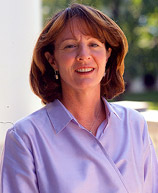Most people consider the words "evangelical" and "feminist" to be contradictory. But for the 40 people who attended Pamela Cochran’s discussion in Center Hall 216 on Tuesday, the two streams of American culture may have gravitated closer to each other.
Pamela Cochran is the associate director of the Center on Religion and Democracy and lecturer in religious studies at the University of Virginia. Her most recent book, Evangelical Feminism, traces the complex journey of modern Christian feminist thought in America.
 On Tuesday she explained how, in the midst of the cultural revolutions of the ‘60s and ‘70s and the evangelical backlash of the ‘80s and ‘90s, an alternative feminism emerged that offered Christian women a way to be feminist but still hold moral values that align with their faith.
On Tuesday she explained how, in the midst of the cultural revolutions of the ‘60s and ‘70s and the evangelical backlash of the ‘80s and ‘90s, an alternative feminism emerged that offered Christian women a way to be feminist but still hold moral values that align with their faith.
Cochran opened the discussion by recounting the series of events surrounding the International Bible Society’s 1997 decision to publish and distribute the New International Version, Inclusive Language Edition, of the Bible. The NIVI, as it is called, was gender-inclusive, meaning that it consistently utilized gender-neutral language when biblical words or context allowed for it.
This move prompted an influential group of Christian leaders, publications, and organizations to mount a forceful opposition. James Dobson’s Focus on the Family pulled its children’s bible texts that included the gender-neutral language from bookshelves. Jerry Falwell, Paige Patterson, the Council on Biblical Manhood and Womanhood, and many others led by the conservative World Magazine all pushed against the International Bible Society’s attempt to augment the translation of the bible. Ultimately, they were successful in preventing the NIVI’s distribution in the United States and issued guidelines on biblical translation. A concern for some, however, was that none of those raising concerns about the translation were experts in the field itself.
In 2001 The International Bible Society (IBS) released Today’s New International Version of the New Testament with a number of translation changes, including gender-inclusion. Although only about 30% of the changes relate to gender, this is the only area that has met opposition.
Why has the International Bible Society been pressed on these issues of gender by the Evangelical Community? Why is the Evangelical community so concerned about the dynamics of gender roles?
This focus of Cochran’s book and discussion was just that. She provided the context through which to inspect it all. She traced the evangelical movement’s history through the 1960s and 1970s when moral, sexual, and political revolutions in America were seen by some as destroying the fabric of the stability represented by the 1950s’ strong, church-going families. She explained that the Evangelical response to this was an attempt to address these contemporary problems. Women’s role in society became a symbol of that end. They believed that the Bible held inherent truths that should guide their lives and methods to achieve social harmony.
James is a reporter for The Bachelor. This story appeared in the 2-22-07 edition.